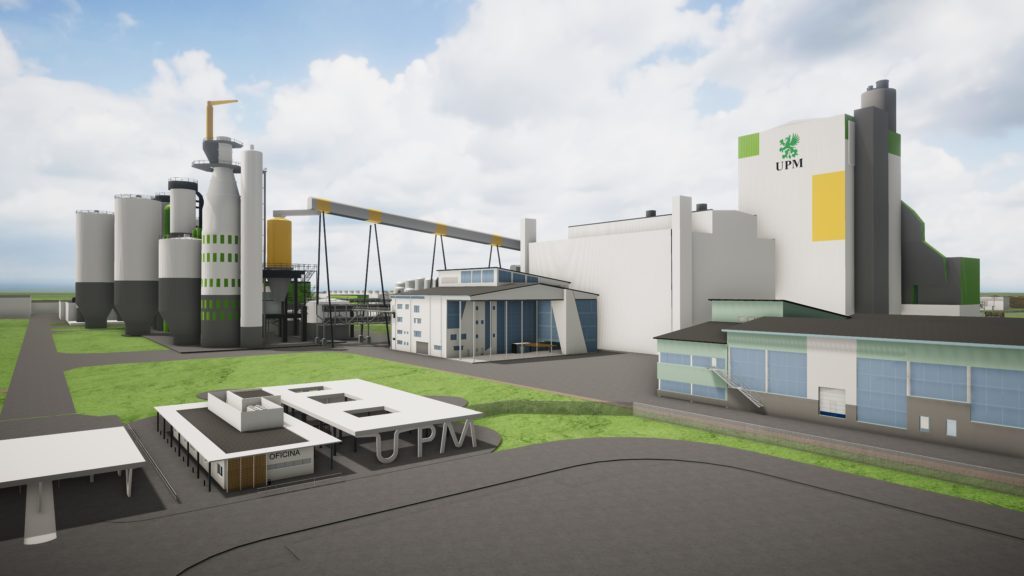
Features
Equipment & Systems
Pulp
Tissue
UPM invests in pulp mill in Uruguay to boost production
US$2.7B mill investment and a US$350M boost to port and local logistics will increase pulp production capacity by more than 50 per cent
January 6, 2020 By Sari Hörkkö
 Artist’s impression of UPM’s new 2.1M-tonne greenfield eucalyptus pulp mill in central Uruguay. Photo: UPM/Informa Group
Artist’s impression of UPM’s new 2.1M-tonne greenfield eucalyptus pulp mill in central Uruguay. Photo: UPM/Informa Group At the end of July 2019, UPM made the decision to invest in a 2.1-million-tonne greenfield eucalyptus pulp mill near Paso de los Toros in central Uruguay.
The mill investment of USD 2.7 billion will grow UPM’s current pulp production capacity by more than 50 per cent from the current 3.7 million tonnes annually, resulting in a step change in the scale of its pulp business.
In addition to the mill construction, UPM will invest USD 350 million in port operations in Montevideo and local facilities in Paso de los Toros.
The prerequisites for the investment, including significant modernization of infrastructure, have been carefully prepared in cooperation with the state of Uruguay over the past three years.
Among other preparations, site works for the mill and dredging of the port have already commenced, while tendering for the main equipment and manning of the project is ongoing.
The mill is scheduled to start up in the second half of 2022.
State-of-the-art mill to produce premium pulp
The new pulp mill has been created as an efficient single-line operation representing state-of-the-art design in the pulp industry.
The machines, materials, level of automation and standards enable a high operating rate and maintainability, consistent quality premium pulp as well as high energy output, ensuring excellent safety and environmental performance.
The mill is designed to fully meet strict Uruguayan environmental regulations, international standards and recommendations for modern mills, including use of the latest and best available proven technology (BAT).
The environmental performance of the mill will be verified with comprehensive and transparent monitoring.
In addition, the safety and sustainability performance of the entire value chain, from plantations to customer delivery, is expected to be on an industry-leading level.
When in operation, the mill will generate a surplus of around one TWh of renewable wood-based electricity annually – providing a stable source of revenue and strengthening Uruguay’s energy balance.
Efficient wood supply and logistics
Availability of sustainably sourced eucalyptus wood for the new mill is secured through UPM’s plantations on its own and leased land as well as through wood sourcing agreements with private partners.
UPM’s 30-plus years’ experience in plantation operations in Uruguay secures well managed and productive plantations which produce high-quality pulp raw material.
Efficient logistics to ensure supply security from the new mill into global markets will be secured by road improvements, extensive railway modernization and construction of a port terminal.
UPM will build a deep sea pulp terminal in Montevideo’s port with an investment of approximately USD 280 million.
Direct rail access from the mill to this modern deep sea port terminal creates an efficient supply chain to world markets.
Significant economic boost
Based on independent socioeconomic impact studies, the new pulp mill is estimated to increase Uruguay’s gross national product by about two per cent and the annual value of exports by approximately 12 per cent.
Construction of the mill will provide job opportunities for individuals and companies globally.
In the most intensive construction phase, there will be more than 6,000 workers on the site.
When completed, approximately 10,000 permanent jobs will be created in the Uruguayan economy – 4,000 of those directly employed by UPM and its subcontractors.
About 600 companies will be working in the value chain.
In addition, the company will also fund improvement of the municipal wastewater treatment plant and restoration of the municipal landfill in Paso de los Toros.
Local investments outside the mill fence total USD 70 million.
UPM will also invest in a new residential area in Paso de los Toros and provide temporary housing for personnel employed by the project.
Long-term commitment in sustainable eucalyptus plantations
In Uruguay UPM today operates a eucalyptus pulp mill in the southwestern town of Fray Bentos, as well as a forestry and wood sourcing company – UPM Forestal Oriental – which has two nurseries that produce seedlings for UPM’s tree plantations.
Establishment of these eucalyptus plantations started at the beginning of the 1990s on former grazing land and they have thus not replaced native forest or arable land.
All of UPM’s eucalyptus plantations are certified to both FSC and PEFC standards and all forestry operations are based on the standards of sustainable forest management.
Today UPM manages over 380,000 hectares of plantations in Uruguay. These supply wood for the UPM Fray Bentos mill and will also supply the new mill in central Uruguay.
Eucalyptus trees grow fast and seedlings will provide wood within 10 to 12 years. Still, what is done in the plantations is long-term work – seedlings planted today will be available as wood on the mills’ fibre lines 10 years from now.
UPM mainly grows Eucalyptus grandis and E. dunnii species but also hybrids between different species have been developed. A genetic improvement programme which is based on traditional breeding techniques familiar from agriculture has significantly enhanced the wood yield and fibre quality.
UPM Euca pulp for versatile tissue products
The Fray Bentos pulp mill started operations in 2007.
Its annual production capacity is 1.3 million tonnes of eucalyptus pulp, which is shipped to customers mainly in Europe and Asia.
Since the launch of the mill, the product characteristics of UPM’s eucalyptus pulp – UPM Euca – have been developed in close cooperation with customers.
The mill’s own eucalyptus laboratory analyzes samples frequently and gives instant feedback on how fibres behave in the production process.
UPM Euca is a very adaptable, general-purpose hardwood pulp that is easy to refine and suitable for a variety of paper grades. UPM Euca pulp gives softness, smoothness, cleanliness and good brightness.
“Many of our tissue customers have been growing successfully while using UPM pulps,” says Mats Backman, director, technical customer service and R&D. “The new state-of-the-art pulp mill with the capacity to produce 2.1 million tonnes of UPM Euca pulp will enable us to supply more fibres that our customers really can trust, and what’s more, to grow with both our current and new customers.
“Through this investment we can not only provide reliable deliveries and trouble-free operation but also want to work together in finding solutions for the market needs of today and tomorrow.”
This article was originally published in Tissue World Magazine.
Sari Hörkkö is director, stakeholder relations at UPM Pulp.
Print this page
